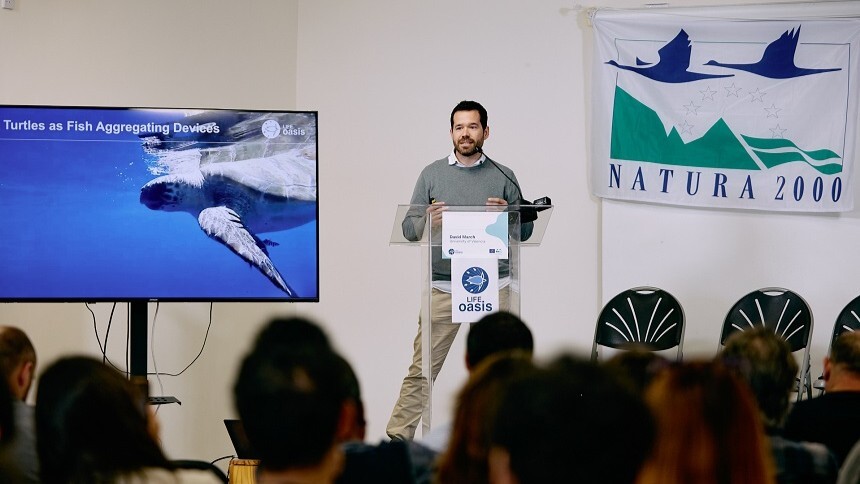David March, researcher of excellence from the Valencian Community at the Cavanilles Institute of Biodiversity and Evolutionary Biology (ICBiBE) has participated in Guardians of the Ocean, an international scientific conference on the impact of fishing on oceanic systems. The researcher has explained the aggregation behavior of pelagic species around floating objects, such as Fish Concentration Devices (FADs)
Guardians of the Ocean is part of the European project LIFE OASIS, which has 5.5 million euros and aims to improve methods against ghost fishing -that produced by lost or abandoned fishing gear (APPA) in the sea- and protect Mediterranean biodiversity.
The Cavanilles Institute of Biodiversity and Evolutionary Biology (ICBiBE), located in the Science Park of the University of Valencia, participated both in the scientific sessions of Guardians of the Ocean and in the internal coordination spaces of LIFE OASIS with its team, David March (principal investigator), Mar Izquierdo and Eva Horcajo. David March’s plenary paper, "The OASIS Effect," explained his line of research, key to designing more sustainable fisheries solutions that reduce bycatch and minimize impacts on the ecosystem.
In particular, David March stressed the importance of applying advanced marine biodiversity observation systems such as drones, underwater cameras, hydrophones and environmental DNA analysis (eDNA), to generate detailed knowledge about open sea ecological dynamics. Our goal is to integrate new monitoring technologies with standardized protocols that allow us to obtain data useful for both science and fisheries management," he said.
"Our goal is to integrate new monitoring technologies with standardized protocols that allow us to obtain data useful for both science and fisheries management," said David March, ICBiBE researcher
In addition to participation in the scientific programme, ICBiBE participated in coordination meetings such as the oasis effect assessment, the estimation of the risk of entanglement of sea turtles in ghost fishing gear and the development of protocols to record and report the presence of abandoned or lost nets at sea. These actions reinforce the scientific component of the project and establish concrete tools to improve the sustainability of fisheries in the Mediterranean.
The Guardians of the Ocean conference, held on 3 April at the Xrobb l-Gapfte Wildlife Rehabilitation Centre and Park in Malta brought together specialists, policy-makers and fishermen to strengthen regional cooperation and innovation in Mediterranean marine conservation. The Parliamentary Secretary for Fisheries and Aquaculture of Malta, Alicia Bugeja Said, opened the event and highlighted the country’s new fisheries policies, with legal reforms that increase the representation of local fishermen in national decision-making and new EU-funded programmes that encourage the adoption of selective fishing gear and improvements on board.
Source: UV News
Recent Posts


